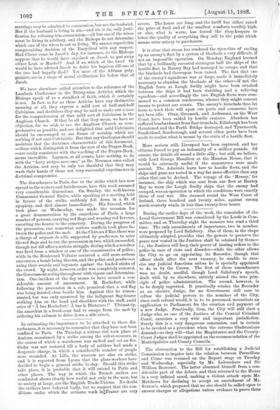During the earlier days of the week, the remainder of
the Local Government Bill was considered by the Lords in Com- mittee, and on Thursday night the measure was read a third time. The only amendments of importance, two in number, were proposed by Lord Salisbury. One of them, in the shape ultimately adopted, provides that the powers to preserve the peace now vested in the Justices shall be retained by them- i.e., the Justices will keep their power of issuing orders to the police in case of riots and disorder—while the other allows the City to go on appointing its Recorder, though that officer shall, after the next vacancy, be unable to exer- cise any judicial functions unless he is specially appointed to do so by the Crown. The first of these amendments was, no doubt, needful, though Lord Salisbury's speech, dealt with by us elsewhere, entirely missed the true prin- ciple of police administration. The second, however, is to be deeply regretted. It practically retains the Recorder as an elective Judge, for no Government will care to refuse the judicial powers to the nominee of the City, since such refusal would, it is to be presumed, necessitate an application to Parliament for the creation and payment of a new Judge. Practically, then, the City will still elect a Judge who, as one of the Justices of the Central Criminal Court, exercises a very wide and important jurisdiction. Surely this is a very dangerous concession, and is certain to be invoked as a precedent when the extreme Gladstonians demand—as they will—that the Magistrates and the County- Court Judges shall be appointed on the recommendation of the Municipalities and County Councils.


































 Previous page
Previous page